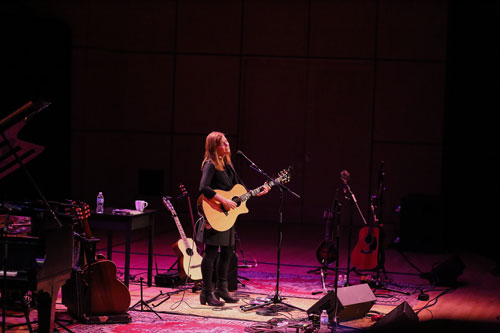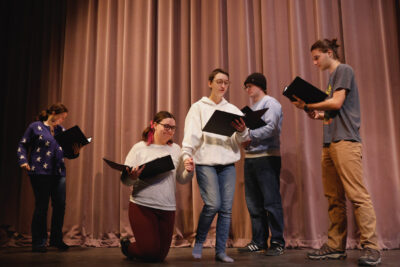Carrie Newcomer smiled and picked up her guitar as the welcoming applause faded. She plucked a few notes and began to play: “I believe there are some debts that we never can repay/I believe there are some words that you can never unsay/And I don’t know a single soul/Who didn’t get lost along the way.”
The low, sweet alto voice woven through piano and guitar brought the poetry to life, as if someone had married James Taylor’s music to Mary Oliver’s poetry and mysticism.She sang about the details of life: about ginger tea, jelly jars, and wool gloves, but as she sang, these details became symbols for broader themes of humanity, love, and belonging. When a song ended, you could feel the breathless pause as the audience waited for the last note to trail into silence.
Newcomer’s songs were meaningful in and of themselves, but they became even more so when she framed them in the context of current events. The Goshen College alumna recounted a question she once asked a friend, “What can we do when we are personally or politically heartbroken?” The song “Sanctuary” arose from that conversation.
“Sanctuary” talks about the importance of taking refuge from heartbreak until it is possible to carry on. Directly after “Sanctuary,” Newcomer led the audience in a sing-along entitled “If Not Now,” which is a call to hope and action. “Sanctuary” and “If Not Now” balanced one another, and the messages were particularly powerful side by side.
Karin Bergquist and Linford Detweiler of Over the Rhine followed Newcomer’s performance, and channeled a similar mystical, poetic feel. A guitarist joined the musical couple onstage for the show, augmenting the vocal harmonies with beautiful twangy bends.
The chemistry between the couple was obvious in their harmonies and in the way they joked around with one another and interacted on stage. It was easy to believe that these two people have been playing music together for over 25 years.
Over the Rhine opened with the title track of their most recent album, “Meet Me at the Edge of the World”, a tune that feels like an intentional walk through a field. In fact, several of the songs on that album are about the two musicians’ small farm in Ohio.
On mornings when fog surrounds the farm, Detweiler has said that they feel like they are sitting on the edge of the world. Like Newcomer, it is clear that Bergquist and Detweiler think deeply when they write songs, pulling from the point where their souls overlap with their surroundings.
Even the raucous “Gonna Let My Soul Catch My Body” (in which Bergquist used her guitar as a percussion instrument) had a deep, insightful energy about it, describing the way one feels while traveling long distances.
The performers filled Sauder to the brim with poetic insights and interesting stories, not to mention well-executed piano and guitar solos. Both sets of artists combined storytelling, spirituality, and musical aptitude with extreme grace, resulting in a beautiful creative space.
Most importantly, the artists connected with the body of people gathered in Sauder Hall that evening and gave them the gift of well-crafted song. That Sunday evening, we the audience were not passive listeners, instead invested in the story behind the song.
That is what gives music meaning.


